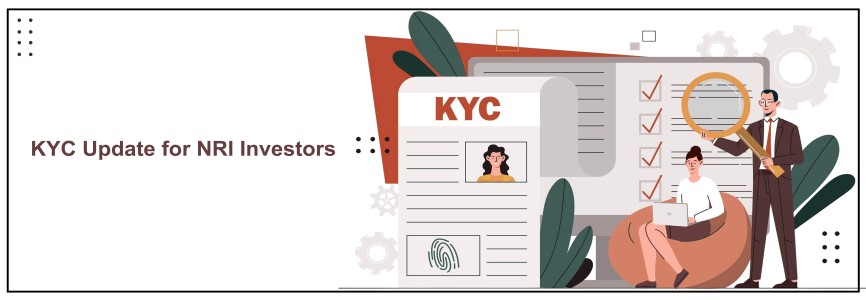The recovery of shares for Non-Resident Indians (NRIs) has become an important concern for many investors who moved abroad years ago but still hold shares in Indian companies. Over time, changes in address, signature, or failure to update KYC (Know Your Customer) details often lead to these shares becoming unclaimed or being transferred to the Investor Education and Protection Fund (IEPF). To recover such shares or claim unpaid dividends, NRIs are required to update their KYC details with the company’s Registrar and Transfer Agent (RTA). This process helps verify their identity and ensures a smooth and secure recovery of their investments.
Need for KYC Updation
KYC updation is mandatory for all investors - resident or non-resident - under SEBI’s guidelines to ensure that their identity, address, and bank details are valid and up to date. For NRIs, it is even more crucial due to the following reasons:
-
Verification of Ownership: Ensures the rightful claimant is identified during recovery of physical or dematerialized shares.
-
Compliance with FEMA and SEBI Regulations: NRIs must comply with foreign investment and repatriation norms while dealing in Indian securities.
-
Prevention of Fraud: Helps prevent misuse or fraudulent claims related to unclaimed shares and dividends.
-
Smooth Processing of Refunds from IEPF: Accurate KYC records expedite verification during refund claims of shares or dividends transferred to IEPF.
-
Banking and Taxation Requirements: Ensures linkage with NRE/NRO accounts for dividend repatriation and tax compliance.
Types of Documents Required for KYC Updation (for NRIs)
When updating KYC details, NRIs must submit self-attested copies of relevant documents. All documents should be attested by the Indian Embassy/Consulate or notarized by a Notary Public in the country of residence. Commonly required documents include:
1. Identity Proof
-
Copy of valid Passport
-
Copy of PAN Card
2. Address Proof
-
Overseas Address Proof: Residence Permit / Utility Bill / Driving License / Bank Statement showing foreign address
-
Indian Address Proof: Aadhaar Card, Voter ID, or Indian Bank Statement
3. Bank Details
-
Cancelled cheque leaf of NRE/NRO account with IFSC and MICR code
-
Latest Bank Statement
4. Signature Verification
-
Specimen signature attested by the banker or notarized
5. Additional Documents (if applicable)
-
Copy of OCI / PIO Card (for Overseas Citizens of India / Persons of Indian Origin)
-
Passport-size photograph (recent)
-
In case of joint holders – KYC of all holders is required
-
For share transmission (in case of deceased holder) death certificate and legal heir documents
Process of KYC Updation for NRIs in Share Recovery
The process typically involves coordination with the Registrar and Transfer Agent (RTA), the company, and in some cases, the IEPF Authority. The steps are as follows:
Step 1: Contact the RTA or Company
Identify the RTA handling the company’s shares. Contact them to confirm your folio details and pending KYC requirements.
Step 2: Obtain and Fill KYC Forms
Download the prescribed KYC updation form (often referred to as Form ISR-1, ISR-2 and SH-13 under SEBI regulations) from the RTA’s website. Fill in the details like name, address, PAN, email ID, mobile number, and bank account details.
Step 3: Attach Required Documents
Attach self-attested and properly notarized copies of all documents mentioned above. For NRIs, overseas address proof and NRE/NRO bank details are mandatory.
Step 4: Signature Verification
If there is a mismatch in the signature or if it has changed over time, submit a banker’s attestation or signature verification form certified by the Indian Embassy or Notary Public.
Step 5: Dispatch the Documents
Send the physical set of documents to the company’s RTA office in India through courier or postal service.
Step 6: RTA Verification,
The RTA will verify the submitted documents. If everything is in order, the shareholder’s KYC records are updated, and any pending share transfer, duplicate issue, or IEPF claim process can proceed.
Step 7: Recovery or Claim Process
Once KYC is updated:
-
For unclaimed physical shares, you may request reissue of share certificates.
-
For IEPF cases, you can file Form IEPF-5 online and submit the acknowledgment with supporting documents to the nodal officer for verification.
Conclusion
Keeping your KYC details updated is one of the most important steps for NRIs who want to recover their old or unclaimed shares in Indian companies. Many investors lose access to their shares or dividends simply because their address, bank, or signature details are outdated. Updating your KYC ensures that your identity and ownership are verified, helping you avoid unnecessary delays or confusion during the recovery process. By completing this simple procedure with the company’s Registrar and Transfer Agent (RTA), you make sure your records are accurate, your dividends reach your correct bank account, and your investments stay secure. In short, KYC updation is not just about following rules it’s about protecting what’s rightfully yours and staying connected to your financial assets back home.











































































_crop10_thumb.jpg)


































































_crop10_thumb.jpg)
_crop10_thumb.jpg)



_crop10_thumb.jpg)


_crop10_thumb.jpg)





_crop10_thumb.jpg)

_crop10_thumb.jpg)














-suratgujarat-section-158_crop10_thumb.jpg)
-suratgujarat_crop10_thumb.jpg)
-(33)_crop10_thumb.jpg)



-ahmedabad_crop10_thumb.jpg)
-learn_crop10_thumb.jpg)

-learnn_crop10_thumb.jpg)



























































_crop10_thumb.jpg)























_Guidelines_learn_crop10_thumb.jpg)























_learn_crop10_thumb.jpg)
_crop10_thumb.jpeg)










_crop10_thumb.jpg)




_Second_Amendment_Rules,_2025_learn_crop10_thumb.jpg)







_learn_crop10_thumb.jpg)












































_learn_crop10_thumb.jpeg)























_learn_crop10_thumb.jpg)



_rd_roc_learn_crop10_thumb.jpg)
















_learn_crop10_thumb.jpg)














_learn_crop10_thumb.jpg)
_Learn_crop10_thumb.jpg)










































_learn_crop10_thumb.jpg)




_learn_crop10_thumb.jpg)













_crop10_thumb.jpeg)















